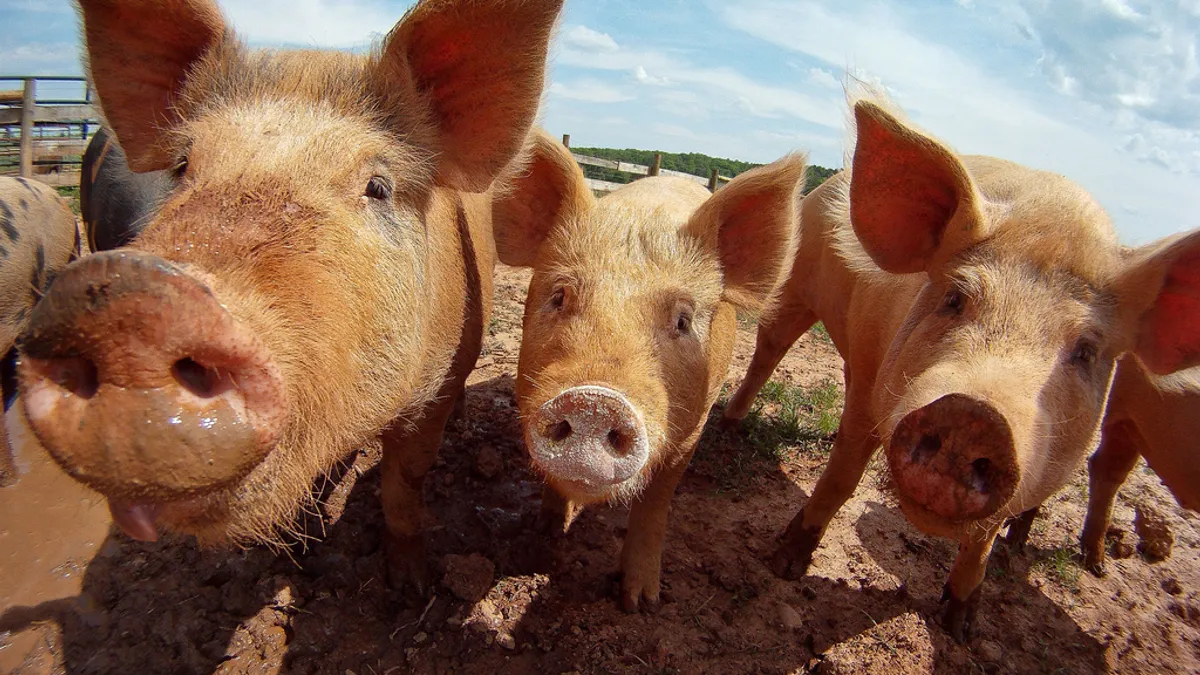Dive Brief:
- "Uncertainty in the protein industry is related to the outbreak of African swine fever," (ASF) said Hormel CEO Jim Snee on the company's Thursday earnings call. ASF, a deadly, highly contagious disease has been spreading across Asia and Eastern Europe for the last year. The fast spread has cut China's hog population in half according to Reuters, which has created volatile markets for agricultural inputs related to hog raising, such as soybeans, and other protein sources, such as beef and chicken, which are being consumed at greater frequency in the countries affected by the disease.
- The effect on markets has been slow to build, but the resulting volatility has made financial forecasting difficult for U.S. meat businesses. "On our second quarter call, we discussed our view that commodity markets would start to increase on higher demand for pork from China. While we have not seen consistently higher prices, we have seen higher volatility and expect that trend to continue," said Hormel CFO Jim Sheehan on the same call. He expects to see pork prices rise in the fourth quarter.
- Tyson CEO Noel White said on a recent earnings call roughly 5% of global animal protein supply has been wiped out by the disease. He is confident Tyson will benefit, either directly or indirectly, despite the intervening price volatility. The X-factor is when significant shipments of pork from the U.S. to China might begin.
Dive Insight:
In part, the volatility in terms of pork prices, and the rebounds to inputs and other meats, is the result of the U.S.-China trade war in combination with the ASF phenomenon. The U.S. is traditionally a major exporter or pork to China and basic principles of supply and demand would dictate that a drop in Chinese domestic supply would increase demand for American pork. But the trade war has put a wrench in most agricultural export markets from the U.S. to China, and increased tariffs on soybean and pork exports coming in September may add even more volatility.
"Tariffs and trade restrictions add another layer of uncertainty while rumors of tariffs being lifted have created volatility. Tyson Foods continues to support efforts for new trade deals to bring stability to export markets," said White.
While open markets are preferable, White continued to say Tyson will likely benefit from the ASF outbreak with or without tariffs as supply shuffles around to keep up with global demand. "If the tariffs are removed, the U.S. pork industry will likely benefit directly. If they are not we will benefit from backfill and real allocation opportunities," said White.
For meat-producing companies, the uncertainty and potential volatility in the market is immense since the disease affects their selling price and the price of their inputs, or raw materials.
Bunge CEO Greg Heckman said in July: "African swine fever continues to impact Chinese demand for soy meal combined with the unresolved U.S.-China trade, this has altered both typical trade flows and producer marketing patterns."
White confirmed on his call that Tyson is in daily contact with buyers in China to understand their needs. One analyst said Chinese buyers are looking to purchase muscle meats, or cuts of meat, from U.S. companies — a premium product compared to the whole hogs usually traded between the two countries, introducing yet another trade anomaly into 2019.















